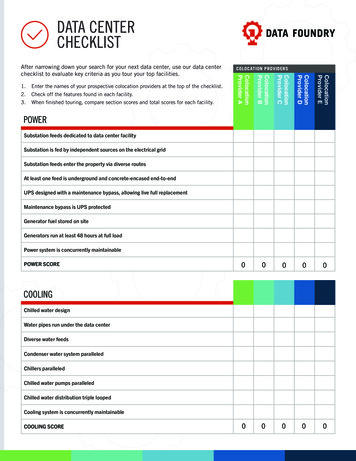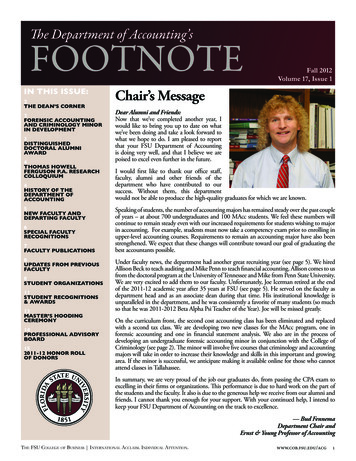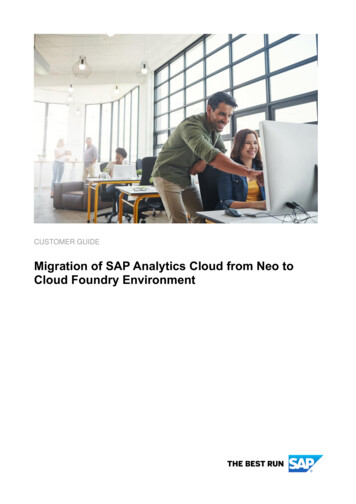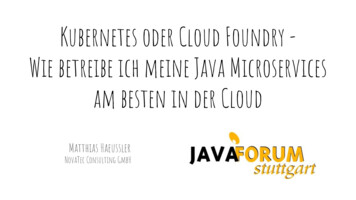
Transcription
Issue 37 August 2020datacenterdynamics.comTHECOVIDISSUEHow data centers are adapting& how we’re fighting back
Cover featurePeter JudgeGlobal EditorWell, thatchangeseverything!Data centers adapted and - mostly - thrived in thepandemic, report Peter Judge and Alex AlleyNever in my career did Idream that the supplychains for cleaningsupplies would beabsolutely critical to ouroperations,” Digital Realty’shead of procurement Brent Shinall toldus in a July DCD keynote speech aboutthe changes the Covid-19 pandemic hasbrought about within his company and thedata center industry.How big are those changes? Well,Shinall was speaking to a three day webconference. DCD has had five globalevents since April, and they’ve all beenonline-only.The Covid-19 pandemic has changedmany of our perceptions of value: cleanersand delivery workers are more importantthan managers; meetings are dangerous;travel is a risk we try to avoid. And digitalinfrastructure has been part of this.14 DCD Magazine datacenterdynamics.comAlex AlleyReporterData centers have enabled digitalcommerce and online meetings, makingdigital infrastructure more important thanever before. That’s given the data centerworld a sense of achievement, and keptdigital businesses operating and growing.But lockdowns have tanked economiesround the world. Data centers are partof an ecosystem, supporting customerswhich pay for their services. Someindustries - entertainment and hospitality,for instance - have been hit harder thanothers, and some data centers will sufferan impact.Some companies have reported theyare preparing for customers that may havetrouble paying their bills. Even if yourtenants are online services booming in thelockdown, there could be long term issues.Zoom is profitable, but others are buildingtheir user base and still losing money.Others tell us that enterprise activitylike data center consolidation is onhold. Physically moving servers, closingbuildings and opening new space, ismassively more complicated in theCovid-19 world.
Mergers and acquisitions are goingahead, along with data center construction,but much of that activity was started beforelockdown, and the obvious difficulties withphysical activities may slow down duediligence somewhat.Given these mixed fortunes, it’s nosurprise that data centers, and otherfirms in the sector, have been grantedgovernment support to keep their servicesup and their staff employed (see box: Ahelping hand).Vital staffThose staff have certainly been dedicated,and operators have stories to tell. In hardhit New York City, DataGryd CEO Tom"Take a vehicle. Go inand do what you needto do and then leave.There’s no need tostick around”Brown says morale is good: “You take astep back and you say, ‘Well, I’m gratefulthat my health is okay and we’re hopefulthat all employees and contractors remainhealthy.’”Stack Infrastructure runs severalhyperscale data centers with arounda hundred technical staff. Chief datacenter officer Mike Casey says the staffare essential workers, and “a lot moreimportant than anybody else on the wholeStack team.”Luckily data centers have been ableto adapt their work patterns. DataGrydinstituted its own “mini lockdown” (onMarch 13), reducing its onsite staff, andonly letting visitors or staff on site when atask can’t be done remotely: “Techniciansare just doing these longer light-load shiftsor they’re on more rotations.”Staff travel also had to alter: “The goodnews is that we have folks that live inNew York City and we are giving strictinstructions to not take mass transit,” saysBrown. “Take a vehicle. We have parkingPhotography: NYIA helping handNo one is invulnerable. Data centersare delivering an essential service,and have been a success story of thepandemic.However, they are part of anecosystem, and some of their partnershave been suffering. For this reason,some companies in the sector havemade use of government support toenable their business to carry on andkeep staff in jobs.In the US, data center companiesthat rely on local businesses,including H5 Data Centers, T5, Gigaand Lifeline.According to published figures,H5 borrowed between 1m and 2m to help retain 64 jobs, while itsQuincy based data center subsidiaryseparately took out another 150,000350,000 PPP loan for 25 jobs. T5 DataCenters borrowed between 5m-10m,but did not disclose the numberof jobs retained. To save four jobs,Giga Data Centers took out between 150,000 and 350,000, while LifelineData Centers borrowed a similaramount, saying it would keep 30 jobs.Other US data center firms whotook government support include5Nines, Hostdime, ScaleMatrixPTS, Green House Data, US Signal,McAllen, Alchemy, Quasar andTonaquint.Other data center specialists inrelated fields including consultancy,cooling system suppliers, andengineering services firms have alsobenefited from the US PPP programwhich has handed out more than 500 billion to companies large andsmall since the lockdown started.right next to the building and they haveto go in and do what they need to doand then leave. There’s no need to stickaround.”Remote management has helped, headds: “We were prepared for somethinglike this, we have managementsystems that allow us to automate a lotof processes. You can check [server]temperatures remotely; you can check ifthere are any big spikes. Should there beany type of alarm, you can work on yourlaptop or your phone.”Working from home was surprisinglyeasy, says DataBank CISO Mark Houpt:“We were impressed by the effectivenessfor us to move online. We were concernedabout the ability of systems like VPNs andto sustain the traffic. We did stress testingand so far we’ve seen no glitches.”Issue 37 August 2020 15
Cover featureCameron Wynne, DataFoundry’s COO, says:“We had to review all of our work downto the physical nature versus things thatwe could do remotely. For their health, wehad to reduce footfall at our data centers. Ifpeople need to be in, they work in differentoffices and socially distance.”Site sterilizationBut some jobs just can’t be done remotely.For those on site, there’s increasedhygiene, with staff using sterilizingwipes on any surface that may have beentouched. Some companies are investing inultraviolet lighting to kill bugs. Biometricsecurity is going hands free, with eyescanners replacing fingerprint locks. At thefirst whiff of Covid-19, the entire facility issterilized.Data centers have always had businesscontinuity plans to weather naturaldisasters, and Stack adapted their plansto the pandemic, says Casey: “We madechanges to protect our critical operationsstaff and our clients. We are takingtemperatures as folks come through thedoor and increasing our janitorial tasks.We also have different rules for shiftchangeover. We used to overlap shifts, butnot anymore, we now don’t have overlapsjust to keep the separate shift sociallydistanced.”If it all goes wrong and one site has tosend all the staff home, Stack has a planto bus or fly people in from other parts ofthe US.Phillip Koblence, COO at colocationprovider NYI, reckons it’s down tocommunications and practical support:“One of the things that I have found,whether it’s Covid-19 or Hurricane Sandy,we’re taking back roads to go into ourfacilities to ensure that we keep ourcustomers and our business up.”Some staff can’t take risks though.DataFoundry set up a special “furloughpot” for employees who felt unsafe, butWynne says not one employee took a cent:“We gave every single person the abilityto, if they couldn’t work from home, to notcome in and have no penalty. They couldstay home if they felt unsafe or if they feltprecautions weren’t met.“And honestly, all of our folks wantedto come to work. They want to be here."If people need to be in, they work in differentoffices and socially distance”is that communication is key. So, makingsure that the staff is aware that somebodyis looking out for them is key. You want tomake sure people are aware that they’reable to take things like Uber or drive.Because they’ve got to also look out fortheir own families as well, you know.”Despite self-preservation, staff knowthat important services rely on them. Likepolice officers or firefighters, they respondaccordingly, said Koblence: “Duringthings like hurricanes, when people arehunkering down, in our industry, you’rerunning towards the data center.”DataFoundry’s Wynne echoes this:“When a hurricane comes to Houston, Wedrive into it. While the city is evacuating,They want to make their living. We allhave a neighbor who lost their job or wasfurloughed and can’t put food on thetable. And so, our employees have simplychosen to come to work.”Team spiritPart of the reason is team spirit, saysNoel O’Grady, director of sales Irelandat business risk company Sungard AS:“Anybody who is part of the essentialgroup tends to not have too manyproblems. I think it’s because they feellike they’re part of the A-team. In thepast, we’ve seen mission-critical workersfeeling like they’re at the beating heart ofthe issue. They feel like they’re special.16 DCD Magazine datacenterdynamics.comAfter this is over maybe they will goback to the office and say ‘yay we did it!’Whereas everybody else will be saying‘Well, you didn’t really need me!’”DataBank’s Mark Houpt agrees: “Anumber of our staff must work in the datacenters."We have not seen any of those folksfearful to come to work. We’ve seen peoplewilling to step up and take extra shiftswhen it was necessary.”They are still cautious of course: “Theywake up in the morning and if they havethe mildest of symptoms related to Covidor someone they live with does, then theyhave to call in and keep everyone notified.”As the pandemic drags on, it’s clearthat some of these measures will be longlasting, or even permanent. DataBank,Data Foundry, and DataGryd all told usthey are looking at moving workloadsaway from the site, so facilities keepoperating optimally with fewer personnelin the data center.
NYI had a head start, says Koblence: “Westarted embracing [remote working] fairlyearly on for a number of reasons. NewYork is a fairly expensive environment forhuman capital, it’s just expensive to haveemployees live in the area but now we canhave specialists in Ohio supervising thosesystems.In Pittsburgh, Data Foundry had tomake changes, when local authoritiesenforced lockdown measures.Police would give fines to anyoneflouting curfew and anyone caughttraveling had to make sure they had agood reason to be out.Seeing the problem coming, Wynnesaid the company shifted very early toremote working and monitoring: “Beforethe Governor started locking things down,we went ahead as a company, and decidedto do as much as possible to get our folksworking from home.“There are lots of things that can bedone remotely, telephone support, ticketsupport and a lot of customer operationscan be done remotely.”Keep buildingWhile all this is happening, there’s a freshsurge in already brisk demand for onlineservices, and more capacity is needed.“We’re very busy,” says Stack’s Mike Casey.“We have quite a few enterprise customersand depending on the business they’re inthey may have been impacted by the virus.But we’re working with those customersand overall, our business continues togrow. We’ve got construction ongoingduring Covid-19.”Construction projects obviously have tobe safe, and those teams are isolated fromthe operations teams, says Casey: “Youdon’t want to be taking any risks with theops guys. If one of them gets ill, the entireteam who he or she is working with alsohas to go in isolation.”Some are even moving plannedprojects forward to keep up with demand.DataGryd had to move projects plannedfor Q4 2020 forward to Q3.NYI has had some increased demand,but it varies by sector, Koblence says:“We have customers that need to rampup bandwidth and maybe add a cabinetor two. We have some customers that arepart of the entertainment industry whosebusiness has essentially shut down rightnow and then we have other services thatare part of the healthcare industry askingus for an increase in capacity.“We have empty server boxes piled upnear dumpsters because we’re getting innew gear,” says Houpt.“This is an example of what’s goingon at DataBank right now, customers are"Some customers mayhave been impacted by thevirus. [But] our businesscontinues to grow. We’ve gotconstruction ongoing duringCovid-19"desperate to increase their capacity. Butother than that, it’s just business as usual.”Technicians on the ground are moreaware of the exceptional circumstances.An NYI technician who did not want to benamed said: “My family is proud that I’vebeen able to work during these uncertaintimes and provide for them."We’ve taken steps as a family tomake sure we reduce the possibility ofcontracting the virus as well as passing iton to others."We also check in on relatives andfriends to see how everyone is doing. Ithelps to know people still care enough tocheck on the wellbeing of others.”Another admitted they had “a small fearthat we could get sick with the virus, butoverall pride.”Issue 37 August 2020 17
Tonaquint. Other data center specialists in related fields including consultancy, cooling system suppliers, and engineering services firms have also benefited from the US PPP program which has handed out more than 500 billion











